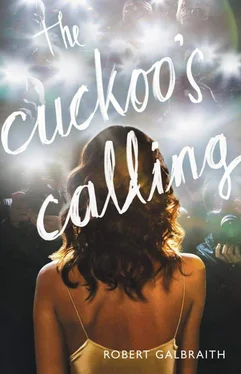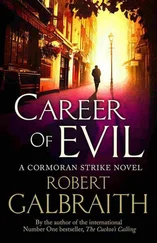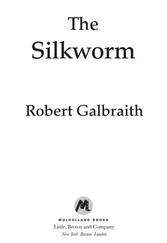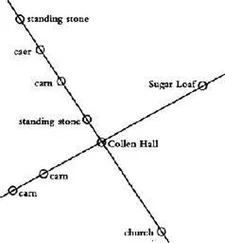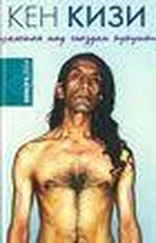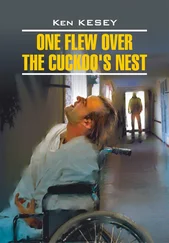They were almost always cheerful, pleasant men, these curators of corpses. Strike followed the mortician into the chilly glare of the large, windowless inner room, with its great steel freezer doors all along the right-hand wall. The gently sloping tiled floor ran down to a central drain; the lights were dazzling. Every noise echoed off the hard and shiny surfaces, so that it sounded as though a small group of men was marching into the room.
A metal trolley stood ready in front of one of the freezer doors, and beside it were the two CID officers, Wardle and Carver. The former greeted Strike with a nod and a muttered greeting; the latter, paunchy and mottle-faced, with suit shoulders covered in dandruff, merely grunted.
The mortician wrenched down the thick metal arm on the freezer door. The tops of three anonymous heads were revealed, stacked one above the other, each draped in a white sheet worn limp and fine through repeated washings. The mortician checked the tag pinned to the cloth covering the central head; it bore no name, only the previous day’s scribbled date. He slid the body out smoothly on its long-runnered tray and deposited it efficiently on to the waiting trolley. Strike noticed Carver’s jaw working as he stepped back, giving the mortician room to wheel the trolley clear of the freezer door. With a clunk and a slam, the remaining corpses vanished from view.
“We won’t bother with a viewing room, seeing as we’re the only ones here,” said the mortician briskly. “Light’s best in the middle,” he added, positioning the trolley just beside the drain, and pulling back the sheet.
The body of Rochelle Onifade was revealed, bloated and distended, her face forever wiped of suspicion, replaced by a kind of empty wonder. Strike had known, from Wardle’s brief description on the telephone, whom he would see when the sheet was revealed, but the awful vulnerability of the dead struck him anew as he looked down on the body, far smaller than it had been when she had sat opposite him, consuming fries and concealing information.
Strike told them her name, spelling it so that both the mortician and Wardle could transcribe it accurately on to clipboard and notebook respectively; he also gave the only address he had ever known for her: St. Elmo’s Hostel for the Homeless, in Hammersmith.
“Who found her?”
“River police hooked her out late last night,” said Carver, speaking for the first time. His voice, with its south London accent, held a definite undertone of animosity. “Bodies usually take about three weeks to rise to the surface, eh?” he added, directing the comment, more statement than question, at the mortician, who gave a tiny, cautious cough.
“That’s the accepted average, but I wouldn’t be surprised if it turns out to be less in this case. There are certain indications…”
“Yeah, well, we’ll get all that from the pathologist,” said Carver, dismissively.
“It can’t have been three weeks,” said Strike, and the mortician gave him a tiny smile of solidarity.
“Why not?” demanded Carver.
“Because I bought her a burger and chips two weeks ago yesterday.”
“Ah,” said the mortician, nodding at Strike across the body. “I was going to say that a lot of carbohydrates taken prior to death can affect the body’s buoyancy. There’s a degree of bloating…”
“That’s when you gave her your card, is it?” Wardle asked Strike.
“Yeah. I’m surprised it was still legible.”
“It was stuck in with her Oyster card, in a plastic cover inside her back jeans pocket. The plastic protected it.”
“What was she wearing?”
“Big pink fake-fur coat. Like a skinned Muppet. Jeans and trainers.”
“That’s what she was wearing when I bought her the burger.”
“In that case, the contents of the stomach should give an accurate—” began the mortician.
“D’you know if she’s got any next of kin?” Carver demanded of Strike.
“There’s an aunt in Kilburn. I don’t know her name.”
Slivers of glistening eyeball showed through Rochelle’s almost closed lids; they had the characteristic brightness of the drowned. There were traces of bloody foam in the creases around her nostrils.
“How are her hands?” Strike asked the mortician, because Rochelle was uncovered only to the chest.
“Never mind her hands,” snapped Carver. “We’re done here, thanks,” he told the mortician loudly, his voice reverberating around the room; and then, to Strike: “We want a word with you. Car’s outside.”
He was helping police with their inquiries. Strike remembered hearing the phrase on the news when he had been a small boy, obsessed by every aspect of police work. His mother had always blamed this strange early preoccupation on her brother, Ted, ex-Red Cap and fount of (to Strike) thrilling stories of travel, mystery and adventure. Helping police with their inquiries : as a five-year-old, Strike had imagined a noble and disinterested citizen volunteering to give up his time and energy to assist the police, who issued him with magnifying glass and truncheon and allowed him to operate under a cloak of glamorous anonymity.
This was the reality: a small interrogation room, with a cup of machine-made coffee given to him by Wardle, whose attitude towards Strike was devoid of the animosity that crackled from Carver’s every open pore, but free of every trace of former friendliness. Strike suspected that Wardle’s superior did not know the full extent of their previous interactions.
A small black tray on the scratched desk held seventeen pence in change, a single Yale key and a plastic-covered bus pass; Strike’s card was discolored and crinkled but still legible.
“What about her bag?” Strike asked Carver, who was sitting across the desk, while Wardle leaned up against the filing cabinet in the corner. “Gray. Cheap and plastic-looking. That hasn’t turned up, has it?”
“She probably left it in her squat, or wherever the fuck she lived,” said Carver. “Suicides don’t usually pack a bag to jump.”
“I don’t think she jumped,” said Strike.
“Oh don’t you, now?”
“I wanted to see her hands. She hated water over her face, she told me so. When people have struggled in the water, the position of their hands—”
“Well, it’s nice to get your expert opinion,” said Carver, with sledgehammer irony. “I know who you are, Mr. Strike.”
He leaned back in his chair, placing his hands behind his head, revealing dried patches of sweat on the underarms of his shirt. The sharp, sour, oniony smell of BO wafted across the desk.
“He’s ex-SIB,” threw in Wardle, from beside the filing cabinet.
“I know that,” barked Carver, raising wiry eyebrows flecked with scurf. “I’ve heard from Anstis all about the fucking leg and the life-saving medal. Quite the colorful CV.”
Carver removed his hands from behind his head, leaned forwards and laced his fingers together on the desk instead. His corned-beef complexion and the purple bags under his hard eyes were not flattered by the strip lighting.
“I know who your old man is and all.”
Strike scratched his unshaven chin, waiting.
“Like to be as rich and famous as Daddy, would you? Is that what all this is about?”
Carver had the bright blue, bloodshot eyes that Strike had always (since meeting a major in the Paras with just such eyes, who was subsequently cashiered for serious bodily harm) associated with a choleric, violent nature.
“Rochelle didn’t jump. Nor did Lula Landry.”
“Bollocks,” shouted Carver. “You’re speaking to the two men who proved Landry jumped. We went through every bit of fucking evidence with a fine-toothed fucking comb. I know what you’re up to. You’re milking that poor sod Bristow for all you can get. Why are you fucking smiling at me?”
Читать дальше
